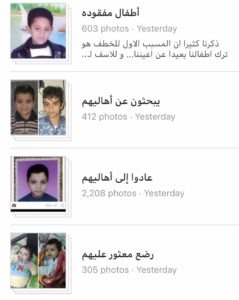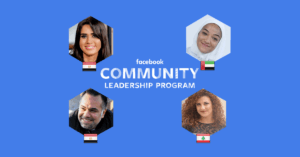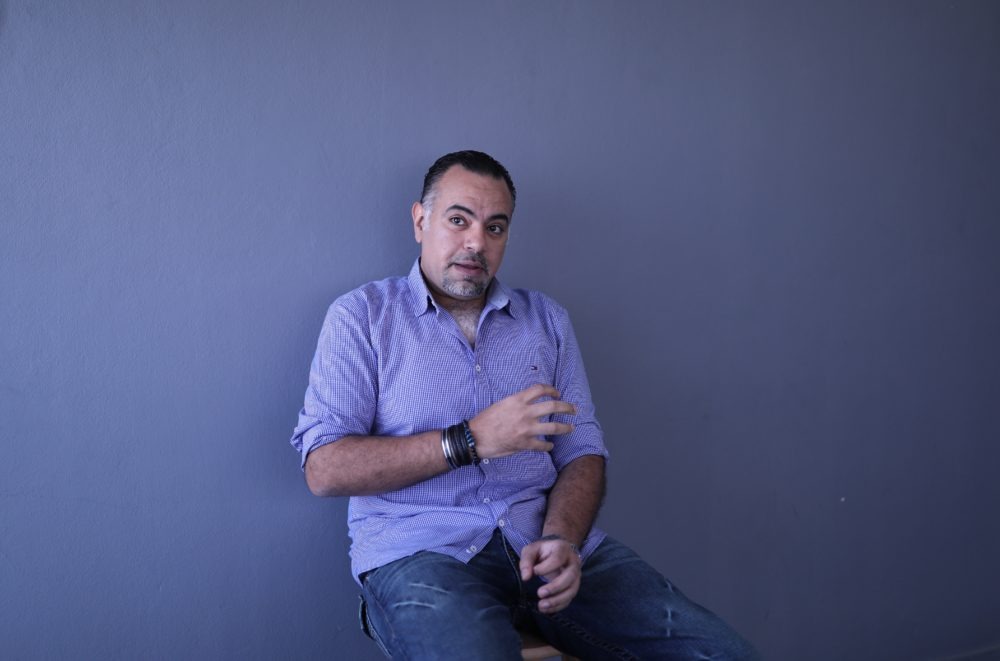Search Facebook for ‘Atfal Mafkoda’ (which translates to ‘Missing Children’) and you will come across a page holding that name with over 1.3 million likes. Upon entering it, you might find nothing unusual; a page sharing posts about missing children. We’ve always found such posts online, but now, someone is aggregating them.
A few weeks ago, however, Facebook announced that the man who created the page, Rami Elgebali, will be one of the 115 people chosen from around the world to participate in the pilot year of their Community Leadership Program. According to the tech giant, their newly-founded program aims to empower community leaders from around the world and enable them to affect more change.
On the program’s page, clicking on Elgebali’s picture reveals a brief description of the community service he provides and states that he “helped more than 950 people make their way back to their families”. And after verifying that, Facebook funded Elgebali’s cause with $50,000.
Sharing pictures of missing children is not new or even exclusive to social media, so, what makes Atfal Mafkoda special?
Days after Elgebali’s return from Facebook’s headquarters in the US, we sat down with him to dissect the origins and inner-workings of Atfal Mafkoda, the challenges he faces while working on it and where he sees it headed in the future.
Origins and Evolution
An IT and services professional with a bachelor’s degree in architectural engineering he acquired solely to please his father, Elgebali is a middle-aged Egyptian parent with a barrel chest and a light salt-and-pepper scruff.

A screenshot from Atfal Mafkoda
He admits that, three years ago, the seeds of Atfal Mafkoda were not to help find missing children. Elgebali’s sole purpose was to deliver one message: “if your child goes missing, you’ll never find them.”
But unsuspectingly, looking for missing children online transformed his view. “I wanted to prove to someone I know that the picture of a child she just shared was fake, and that the child has probably reunited with his family years ago.” Skeptic and wanting to prove her wrong, Elgebali called the numbers and did his homework. He discovered the child was still missing, but stubbornly, wanted to prove to her that 90% of the pictures of missing children online are fake. Again, the other eight he looked up that day to make a point were about children who are still missing. “You could hear it in their parents’ voices, and it’s depressing,” said Elgebali recalling the calls. “And that was a lucky streak, because this is not the usual. Many of them are either fake or already reunited with their parents. I think God wanted me to find only missing children so I’m motivated to take action.”
The page then only collected verifiable posts about missing children. In its first week, it garnered around 1,000 likes. In the second week, they increased to 10,000. Four months since its creation, it swept up 300,000 likes! “And then, my life changed. A message to the page informed us that one of the missing children we had posted about earlier was found on the streets. His mother recognized him and they reunited. A child had been returned and I thought I couldn’t stop now,” he described as he lowered his voice. He asked the mother to shoot a video of the moment she and her son laid eyes on each other and it reached 7 million people! “The page was receiving around two to three messages per minute! At first I had to look for missing children online myself, but then I was being asked by thousands of people to help them find their children.”
Today, he has six admins helping him handle the page and the services they provide are a lot more than just sharing posts. They helped organize a network of volunteering lawyers who specialize in protecting children’s rights, created a campaign to improve the Egyptian birth certificate system and attempted changing people’s perspective about handing money to children on the streets through another popular campaign. It wasn’t a long time before children of unknown kinship in children’s homes started contacting them to ask for their help in finding their families.
Dilemmas, Con Jobs and Death Threats
As the page became more popular and its impact grew stronger, the stories Elgebali stumbled upon grew darker. A Pandora’s box had opened up that he couldn’t ignore. Some of these stories he uncovered through people seeking to get in touch with him, others he ran after.
He posited finding people who sell children, who are their own or who they’ve kidnapped, for the purpose of adoption. This is extremely dangerous, especially since it’s illegal in Egypt — hence the process is unregulated. Some of the buyers and sellers of these children he stumbled upon in the comments section of the posts on Atfal Mafkoda! He explains nonchalantly, “So, I created fake Facebook accounts and used the accounts of volunteers to catch them in the act. I would even, after informing the police, meet them face to face if I had to. Of course I’d agree with the police to pretend arresting me.” But Elgeabli admits that taking measures like pretend-arrests didn’t protect him from receiving messages that threaten him and the ones he loves.
He further claimed that he found children’s homes where children are physically abused. And that because he was in constant contact with these homes to ensure the children’s safety and reunion with their parents, he uncovered their dark secrets. He clarifies, however, “not all children’s homes are like that. The good ones co-operate with us. The bad ones…well, we send undercover volunteers to take pictures of all the shady things going on there and find out useful information from whoever we (Atfal Mafkoda team) could talk to.”
Fun fact: there isn’t any proof of identity on your birth certificate. You could literally exchange the identities of two Egyptian children and no one would have a document that could falsify their new identities. And if you’re speculating that this would facilitate child trafficking, Elgebali would enthusiastically agree. He made a campaign demanding newborns’ footprints on their birth certificates to no avail. What if you don’t know who your parents are, but on finding out the answer, you thought it would have been better to be left in the dark about it? What if your parents are abusive? Should you be reunited with them or not? Many of the challenges and dilemmas Elgebali faced remain puzzling, paralyzing and difficult to overcome to this day. And as he stumbles through making tremendously difficult decisions and encountering dilemmas lurking in the pitch black corners of humanity, he refuses to step back and delves farther into the pandora’s box he unearthed.
Lessons from Elgebali’s Atfal Mafkoda and The Facebook Community Leadership Program
After a three-year journey, Facebook has acknowledged Elgebali’s efforts and arguably brought him to the international stage.

Via Facebook
As for how he managed to obtain 1.3 million likes, he says, “I had no skills in social media marketing. It was all trial and error. For example, I’d try writing in formal Arabic but they would ask ‘how much did they pay you?’, however when I use Egyptian slang they believe me more. Or if the pictures of the children are high-quality bright, vivid images, they think it’s fake. But pictures of a poorer quality are more believable.”
And he still holds his day job as an IT consultant. “When I started doing this I found it gives to me more than it takes. It may sound cliché but my day somehow feels like it’s 48 hours and the happiness I derive from it is worth all the trouble.”
When asked about what advice he would give based on his experience with Atfal Mafkoda, he firmly said: “Don’t hesitate in taking initiative or wait for other people to lead the way. There isn’t a shortage of problems around us that we could do something about.”
In the future, Elgebali hopes that Egyptian businesspeople will step forward and help Atfal Mafkoda grow. “I want to create a family-oriented app that employs the databases we’ve created over the years and automates the process as much as possible. The less the NGO will depend on humans the better.”




























